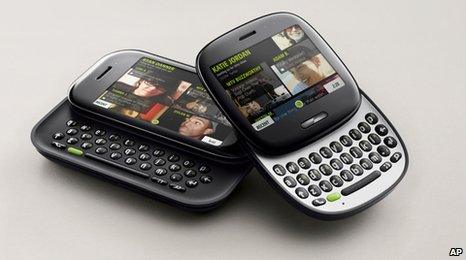Building the perfect mobile phone
- Published

Simple fact. There's no such thing as the perfect mobile phone.
If there was a handset that spewed out free gold bars, someone would complain that the keyboard was a bit fiddly.
Our mobile preferences are deeply personal. Some people just want to make calls; others like having the world in their pocket.
Microsoft's new Kin handsets are firmly aimed at hyper-connected users, who need to know what everyone they've ever met is doing at any given moment.
But social networking is only one of the must-have features for any new hand held device.
Touch screen
Mobile screens are used as much for input as output nowadays.
Early touch screen phones used "resistive" technology, where the pressure of a finger pressing down makes an electronic connection.
These were often slow to respond, leading to a lot of angry prodding and poking.
Newer "capacitive" screens can work with a hard surface, such as glass.
They respond instantly and feel more satisfying to use.
Many mobiles feature "multi touch" where different functions are performed by using more than one finger.
Apple is involved in several legal disputes over multi touch and pinch-and-zoom, claiming rival phone companies have, literally, pinched its patented technology.
Social networking
Anyone who has used the internet in the last five years will have noticed that social networking is almost as big as porn.
Phone companies think we are so in love with it that we won't want to leave our Facebook, MySpace or Twitter at home.
After all, what's the point in walking to the shop to get a pint of milk if you can't tweet the world, 'Walking to the shop to get a pint of milk?'
Some phones feature dedicated social networking applications that either run in the background or have to be opened to check updates.
Facebook for iPhone is the app store's most popular free download.
Several manufacturers have tried to build their entire phone experience around social networking.
Motorola's Motoblur interface allows users to receive updates and news feeds directly on their home screen.
Microsoft's new Kin system is also billed as a social networking phone.
It features the 'kin spot'; a big green dot where users can drag items they want to share with friends.
Apps
Apple didn't invent the mobile app. Windows Mobile and some Nokia devices have been capable of running other software for years.
However, iPhone popularised the idea of downloading programmes to your mobile.
Apps have, in some respects, changed the way people view handsets.
There is less emphasis on the features included on the phone at launch, as these can be added later.
Mobiles are now viewed as a platform - like a computer.
How much memory does it have? How fast is the processor? How big is the screen?
One of the big debates around apps is how they are distributed.
"Closed" systems, such as the iPhone, require apps to be downloaded through Apple's own store. The company can choose to reject some content.
The alternative is an open system, like Google's Android which allows users to download programmes directly from the developers.
Banned stuff
As people get used to smart phones and what they can do, they are starting to compare the different systems.
They are realising some mobiles offer features that others don't.
Apple's refusal to allow Flash video and animation on the iPhone is a subject of great debate in the technology world.
It means many popular video websites won't work on the device.
Another controversial area is Voice Over Internet Protocol (VOIP) applications such as Skype and Google Voice.
Some network operators bar their customers from using alternative systems for making calls.
Apple allows Skype over WiFi, but not using the 3G mobile data connection.
Google Voice runs on Android, but is banned from the iPhone.
It may be, in the near future, that phone users stop basing their mobile choice on the handset altogether, and instead, go for the gadget that best handles their favourite apps.
Perfect phone?
Mobile manufacturers are working furiously to refine their technologies, especially in the highly competitive smart phone market.
At the moment, all the main players have strengths and weaknesses.
However, the iPhone continues to enjoy an iconic position, even if it is not yet the biggest-selling handset.
Its competitors will continue to look for new ways to steal its limelight.
One obvious area for innovation is video calling over the mobile internet, where there has so far been very little movement.
There are some major launches on the way that will further shake-up the mobile business.
Summer 2010 - iPhone OS version 4.0 expected. Introducing multi-tasking (running more than one app at once) on the 3GS. Possible new iPhone handset.
2010 - New updates to the Google Android operating system, code named FroYo and Gingerbread. Few details at the moment. Android platform is likely to benefit from rapid growth in the number of apps, after lagging behind Apple.
Christmas 2010 - Release of Windows Phone 7, the next generation of Windows Mobile. Microsoft's new-look system integrates Xbox Live and the Zune music player.
Symbian, the system used on some Nokia phones, will go open source - meaning developers are free to mess with, tweak, and play around with the operating system.
It's hoped this will lead to fresh, new software and put Nokia back in the smart phone game.
- Published13 April 2010
- Published16 February 2009